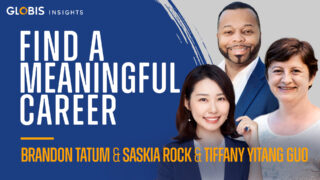We live under pressure from an early age. As a child, you were probably asked what you wanted to become as an adult while your parents looked for signs of talent in sports, music, or math.
If you’re like most people, painfully little room was left for reflecting on finding your purpose.
Paraphrasing the words of American psychologist James Hillman, a purpose or “calling” is an intuition that there’s meaning in our lives, and that each of us has something to pursue and accomplish. According to a recent McKinsey study, most people feel they have a purpose, but only about 65% of them can actually articulate what it is.
For most of us, true purpose doesn’t just arrive—we must go searching for it.
So how do you recognize your purpose, and most importantly act on it?
First, you’ll need to overcome a common misconception: Purpose is often confused with talent, but talent is actually a tool.
Next Article
Your Sense of Purpose Is Influenced by Gender, Nationality, and Personality
How to Find Your Authentic Self for Purposeful Work
Talent as a Tool for Finding Your Purpose
We’ve all heard about gifted kids–chess masters or piano prodigies. Often, they’re pushed towards careers defined by that enormous talent.
But should you pursue something just because you’re good at it?
Regardless of whether you have many talents or just one, it’s worth noting that talent alone doesn’t lead to a fulfilling life. Talents are certainly useful, but they do not necessarily bring more meaning to our lives. Talents and skills should align with our purpose, not the other way around.
The best course is to design your own path to purpose, then address any gaps with new and existing skills and talents.
There’s no one-size-fits-all approach to finding your purpose, but developing an inquisitive mind and inner dialogue is a good start. Here are a few steps to set you on that journey.
Set aside some thinking time.
In her book Pressed for Time, Judy Wajcman, professor of sociology at the London School of Economics, says that modern society is dominated by productivity and busyness as a status symbol. That means time is in short supply, and idle time has a perceived negative value.
However, idle time is when we develop imagination, find inspiration, and nurture creativity. These are all important—they help us read the world. Some days are so busy that we barely have time to sleep. But to find your purpose, you’ll need to set aside a few minutes to recollect, listen, and reflect on your life direction.
Exercise your mind.
There are many ways to clarify your direction, from meditation to exploring new interests and getting in contact with new people. Personally, I find imagination exercises useful to start defining what type of lifestyle, working environment, and daily routines spark my sense of fulfillment and joy.
Here’s a simple exercise to get you started.
Think about what makes you feel like “a fish in water.” It doesn’t necessarily have to be a specific action. It could be a situation or a particular environment that makes you feel like you’re in your element.
Write down as many actions or scenarios as you want—you can always go back and add more or remove ones that your feelings have changed about. The important thing is not to define this exercise by your current life and its rules and limitations.
Next Article
How to Use Meditation at Work for a More Productive 2023
Find the intersection of talent and peace of mind.
Next to your list of positive actions and scenarios, write down your talents and skills. Then compare the two lists.
Are there any gaps? What talents and skills might you need to turn your positive list into an actionable life project?
There you have it: the very first step in how to find your purpose.
Keep reiterating this or similar exercises to uncover your true needs and what brings you a sense of fulfillment. It should be a regular effort to schedule some reflection time and reduce the noise and demands of the outside world.
Unblocking Your Purpose
Translating your purpose into action might sound like the easy part, but a lot of us show a remarkable capacity for stalling. Why is that?
The twentieth-century existentialist philosopher Jean-Paul Sartre startlingly claimed that we’re all fundamentally free. However, many of us make constant excuses not to take advantage of our freedom: “I can’t leave this marriage,” “I am not sure I’ll find a better job than this,” and so on.
These limiting beliefs, which masquerade as absolute truths, can easily hold you back from pursuing your goals and finding your purpose. Here are just a few powerful dynamics that might be sticking you to the status quo.
Next Article
Kokorozashi: Find Your Passion for a Meaningful Career
The Pressure of Family Scripts
“Family scripts,” a phrase coined by psychiatrist John Byng-Hall, are “expectations of how family roles are to be performed within various contexts.” In other words, what is considered appropriate in your family, what kind of work ethic is instilled in you, what is considered a “desirable career” by your parents, etc.
Even as an adult, it can be unclear how much of you–your desires, ambitions, and inhibitions–really belong to you and how much you’ve absorbed from your parents.
Unsurprisingly, the pressure to conform to family scripts can be a big drag on your purpose. If you’re feeling lost, it can help to break down your thoughts with these questions:
- What do I want to do or be?
- What are my biggest fears about doing or becoming that?
- In my family, what types of jobs are well received, and which aren’t?
Maybe you were raised in a house where both parents were freelancers or self-employed. As much as they liked their jobs, financial stability was an issue at home. How did your family’s “money story” affect your life choices growing up?
Or maybe you were a kid who enjoyed drawing, but your dad didn’t let you go to art school because “art is a hobby, not a real job.” How has that stance influenced your career choices?
This kind of reflection can determine the burden of expectation and help you decide what elements are not serving your purpose.
Evolution, Not Revolution
A second big inhibitor to finding your purpose is the thought of change as a revolution. It doesn’t have to be.
When you feel stuck or unfulfilled, you might start to believe that you have to radically modify your behavior and routine, quit your job, or even move to see tangible results.
The myth of what it takes to become “a success” doesn’t help. The media loves flashy stories of entrepreneurs who dropped everything to change their lives 180 degrees.
But that’s not the only way to realize your purpose. Your personal journey of discovery can be a day-to-day evolutionary change. You don’t need to quit your job, leave your partner, or really make any life-altering choice. In the beginning, nobody even needs to know.
It’s OK to start small. Try out different low-risk endeavors, like taking a course to learn a new discipline or skill. Reach out to people working in the field of your purpose, or volunteer for first-hand insights into that world.
Experimenting allows you to try out many roles or possible future professions while not fully committing to any path just yet. And along the way, you’ll gain new talents as tools to move you forward. Don’t forget, too, that you can adjust your purpose to focus more energy on areas that you find most fulfilling.
Purpose-Driven Reflection for Living a Meaningful Life
Finding a more authentic way to live and work is possible, and it can be done at your own pace. But to get results, you will need to set aside some time to reflect and practice. Remember to revisit these questions regularly:
- What do I care about?
- What tools do I need to get to where I want to be?
- What current skills and talents do I have that will help me reach my goal?
- What’s holding me back?
Awareness is power. Once you get a better understanding of where you are and where you want to be, you’ll see logical next steps laid out before you.
Finally, don’t set the bar unrealistically high. You don’t need to revolutionize your life overnight. Your self-actualization journey can be an evolutionary process of self-care and non-judgmental exploration of who you are, what made you this way, and how you can align yourself with your purpose.







